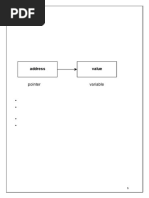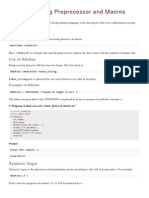C Programming Pointers and Arrays
Uploaded by
slspaC Programming Pointers and Arrays
Uploaded by
slspaC Programming Pointers and Arrays
Arrays are closely related to pointers in C programming but the important difference between them is that, a
pointer variable can take different addresses as value whereas, in case of array it is fixed. This can be
demonstrated by an example:
#include <stdio.h>
int main(){
char c[4];
int i;
for(i=0;i<4;++i){
printf("Address of c[%d]=%x\n",i,&c[i]);
}
return 0;
}
Address of c[0]=28ff44
Address of c[1]=28ff45
Address of c[2]=28ff46
Address of c[3]=28ff47
Notice, that there is equal difference (difference of 1 byte) between any two consecutive elements of array.
Note: You may get different address of an array.
Relation between Arrays and Pointers
Consider and array:
int arr[4];
In arrays of C programming, name of the array always points to the first element of an array. Here, address of
first element of an array is &arr[0] . Also, arr represents the address of the pointer where it is pointing.
Hence, &arr[0] is equivalent to arr.
Also, value inside the address &arr[0] and address arr are equal. Value in address &arr[0] is arr[0] and
value in address arr is *arr . Hence, arr[0] is equivalent to *arr .
Similarly,
&a[1] is equivalent to (a+1)
AND, a[1] is equivalent to *(a+1).
&a[2] is equivalent to (a+2)
AND, a[2] is equivalent to *(a+2).
&a[3] is equivalent to (a+1)
AND, a[3] is equivalent to *(a+3).
.
.
&a[i] is equivalent to (a+i)
AND, a[i] is equivalent to *(a+i).
In C, you can declare an array and can use pointer to alter the data of an array.
//Program to find the sum of six numbers with arrays and pointers.
#include <stdio.h>
int main(){
int i,class[6],sum=0;
printf("Enter 6 numbers:\n");
for(i=0;i<6;++i){
scanf("%d",(class+i)); // (class+i) is equivalent to &class[i]
sum += *(class+i); // *(class+i) is equivalent to class[i]
}
printf("Sum=%d",sum);
return 0;
}
Output
Enter 6 numbers:
2
3
4
5
3
4
Sum=21
You might also like
- ASD Course - Chap9 - Pointers and Array in C - Relationship and UseNo ratings yetASD Course - Chap9 - Pointers and Array in C - Relationship and Use6 pages
- Here We Go Through Some Valid Array DeclarationNo ratings yetHere We Go Through Some Valid Array Declaration37 pages
- Address in C: Reference Operator (&) and Dereference Operator ( )No ratings yetAddress in C: Reference Operator (&) and Dereference Operator ( )18 pages
- APznzaZSKyG9U179KTJnHz2neiTGJSFXWm_ErS38XfZqanIekxXlAg2mAKdxLTYVtSBlRgj3K0fuhEa0w9dx1_hHZkrB2BtyWL3on9_e63dKhX6GUKqRpeTeYedSVsvs0E0HX7lGMtICTulH6ht9DPqDV-fGWSKvIGG4yMvmjcjIz5B1ugyU0ptiYWFG6eRqQE_CIJqo4MPfFI2AqxYoxhNo ratings yetAPznzaZSKyG9U179KTJnHz2neiTGJSFXWm_ErS38XfZqanIekxXlAg2mAKdxLTYVtSBlRgj3K0fuhEa0w9dx1_hHZkrB2BtyWL3on9_e63dKhX6GUKqRpeTeYedSVsvs0E0HX7lGMtICTulH6ht9DPqDV-fGWSKvIGG4yMvmjcjIz5B1ugyU0ptiYWFG6eRqQE_CIJqo4MPfFI2AqxYoxh30 pages
- Pointer To Array in C: Pointer Pointing To The Array of ElementsNo ratings yetPointer To Array in C: Pointer Pointing To The Array of Elements2 pages
- Bitbox Page 197 Ques 3 C Programming Er Explain: (A) 2002 (B) 2004 (C) 2020 (D) Lvalue RequiredNo ratings yetBitbox Page 197 Ques 3 C Programming Er Explain: (A) 2002 (B) 2004 (C) 2020 (D) Lvalue Required3 pages
- String Manipulations in C Programming Using Library FunctionsNo ratings yetString Manipulations in C Programming Using Library Functions1 page
- C Programming Break and Continue StatementNo ratings yetC Programming Break and Continue Statement4 pages




















































































